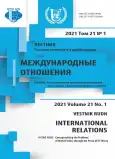The Role of the Cyprus Issue in the Greek-Soviet Relations (1956-1960)
- Authors: Tasoulas A.1
-
Affiliations:
- RUDN University
- Issue: Vol 21, No 1 (2021): Conceptualizing the Problems of World Politics through the Prism of IR Theory
- Pages: 148-156
- Section: HISTORY OF INTERNATIONAL RELATIONS
- URL: https://journal-vniispk.ru/2313-0660/article/view/320336
- DOI: https://doi.org/10.22363/2313-0660-2021-21-1-148-156
- ID: 320336
Cite item
Full Text
Abstract
The article examines the role of the Cyprus issue in the bilateral relations between Greece and the USSR in 1956-1960. It is based on primal archival research realised at the Constantine Karamanlis Archive (AKK) and at the Diplomatic and Historical Archive of the Greek Foreign Ministry (DIAYE) in Athens. The analysis of the recently declassified documents relate to the events which took place in 1954, when the Soviet Union supported the Greek claims for self-determination of the Cypriot people in the United Nations on the basis of the anti-colonial principles. This contributed to the impressive increase in trade between Greece and the USSR, especially after the unofficial visit of the Soviet Foreign Minister D.T. Shepilov to Athens in 1956. Against the backdrop of the deterioration of the international situation in 1957, Kremlin heavily criticized NATO’s decision to deploy the US Intermediate Range Ballistic Missiles (IRBMs) in Europe and applied diplomatic pressures to NATO member-states including Greece. The shift from tensions to a peaceful offensive strategy, characteristic of the Soviet diplomacy towards Greece, proved to be a double-edged sword for Moscow in the long term. The author concludes that both countries exploited the Cyprus issue for their benefit. Thus, Moscow managed to take advantage of the Greek discontent with the NATO allies as a means of increasing its own prestige in the region, while the Greek governments capitalized on the Soviet tactics in order to increase its political leverage in confronting NATO on Cyprus.
About the authors
Argyrios Tasoulas
RUDN University
Author for correspondence.
Email: argyr22@gmail.com
PhD Researcher, Department of Theory and History of International Relations
Moscow, Russian FederationReferences
- Alecou, A. (2016). Communism and Nationalism in Postwar Cyprus, 1945-1955: Politics and Ideologies under British Rule. New York: Palgrave Macmillan.
- Antoniou, A. (2015). Elliniki aristera kai kypriako zitima sti dekaetia tou 1950 [The Greek Left and the Cyprus issue in the 1950s]. Volos: University of Thessaly. (In Greek).
- French, D. (2015). Fighting EOKA: The British Counter-Insurgency Campaign on Cyprus, 1955-1959. Oxford: Oxford University Press.
- Gromyko, A.A., & Ponomarev, B.N. (1986). Soviet Foreign Policy, 1945-1985: in 2 volumes. Vol. 2. Moscow: Nauka publ. (In Russian).
- Hatzivassiliou, E. (1991). Blocking Enosis: Britain and the Cyprus Question, March - December 1956. Journal of Imperial and Commonwealth History, 19(2), 247-263. doi: 10.1080/03086539108582838
- Hatzivassiliou, E. (1992). Greek-Bulgarian and Greek-Soviet Relations, 1953-1959: A View from the British Archives. Modern Greek Studies Yearbook, (8), 119-137.
- Hatzivassiliou, E. (2006). Greece and the Cold War: Frontline State 1952-1967. New York: Routledge.
- Ioannides, C.P. (2014). Cyprus, British Colonialism and the Seeds of Partition: From Coexistence to Communal Strife. Journal of Modern Greek Hellenism, (30), 41-72.
- Johnson, E. (2000). Keeping Cyprus off the Agenda: British and American Relations at the United Nations, 1954-58. Diplomacy & Statecraft, 11(3), 227-255. doi: 10.1080/09592290008406178
- Kalinin, A.A. (2017). Political Aspects of Soviet-Greece Relationships in 1953-1959. Vestnik Vyatskogo Gosudarstvennogo Universiteta, (12), 106-116. (In Russian).
- Kalinin, A.A. (2018). The Greek Conflict in the Context of the Formation of the Bipolar System (1944-1953) [thesis]. Kirov. (In Russian).
- Katsourides, Y. (2014). Anti-Colonial Struggle in Cyprus: Actors, Conceptualisations, Methods and Motives. Journal of Mediterranean Studies, 23(1), 31-46.
- Kourkouvelas, L. (2012). Denuclearization on NATO’s Southern Front: Allied Reactions to Soviet Proposals, 1957-1963. Journal of Cold War Studies, 14(4), 197-215. doi: 10.1162/JCWS_a_00280
- Philippou, L. (2010). The Cypriot Paradox: The Communist Way towards Political Liberalism. The Cyprus Review, 22(1), 129-149.
- Sfikas, Th.D. (2001). War and Peace in the Strategy of the Communist Party of Greece, 1945-1949. Journal of Cold War Studies, 3(3), 5-30. doi: 10.1162/152039701750419493
- Stergiou, A. (2007). Soviet Policy towards Cyprus. The Cyprus Review, 19(2), 83-106.
- Tasoulas, A. (2020a). Decolonization of Cyprus and Position of the Soviet Union (1953-1959). Conflict Studies - nota bene, (2), 42-56. (In Russian). doi: 10.7256/2454-0617.2020.2.33136
- Tasoulas, A. (2020b). A Potential “Apple of Discord”: Cyprus in the Soviet Foreign Policy Analysis, 1946-1953. Voprosy Nacional’nyh i Federativnyh Otnoshenij, 10(8), 2202-2211. (In Russian). doi: 10.35775/PSI.2020.65.8.029
- Ulunyan, A.A. (2001). The Balkans: The Heated World of the Cold War. Greece and Turkey between West and East, 1945-1960. Moscow: IVI RAN publ. (In Russian).
- Xydis, S. (1967). Cyprus Conflict and Conciliation, 1954-1958. Columbus: The Ohio State University Press.
Supplementary files









